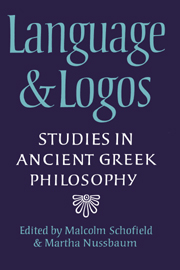Book contents
- Frontmatter
- Contents
- Preface
- Introduction
- 1 Heraclitus' conceptions of flux, fire and material persistence
- 2 Epistemology and meaning in Heraclitus
- 3 The dénouement of the Cratylus
- 4 Cratylus' theory of names and its refutation
- 5 Knowledge and language: the Theaetetus and the Cratylus
- 6 Falsehood and not-being in Plato's Sophist
- 7 Forms and dialectic in the second half of the Parmenides
- 8 Aristotle and the more accurate arguments
- 9 Aristotle on the principles of change in Physics I
- 10 Aristotle on natural teleology
- 11 Accidental unities
- 12 Aristotle's concept of signification
- 13 Saving Aristotle's appearances
- 14 Myths about non-propositional thought
- 15 Gods and heaps
- Bibliography of the publications of G. E. L. Owen
- Index locorum
- Index of names
5 - Knowledge and language: the Theaetetus and the Cratylus
Published online by Cambridge University Press: 09 October 2009
- Frontmatter
- Contents
- Preface
- Introduction
- 1 Heraclitus' conceptions of flux, fire and material persistence
- 2 Epistemology and meaning in Heraclitus
- 3 The dénouement of the Cratylus
- 4 Cratylus' theory of names and its refutation
- 5 Knowledge and language: the Theaetetus and the Cratylus
- 6 Falsehood and not-being in Plato's Sophist
- 7 Forms and dialectic in the second half of the Parmenides
- 8 Aristotle and the more accurate arguments
- 9 Aristotle on the principles of change in Physics I
- 10 Aristotle on natural teleology
- 11 Accidental unities
- 12 Aristotle's concept of signification
- 13 Saving Aristotle's appearances
- 14 Myths about non-propositional thought
- 15 Gods and heaps
- Bibliography of the publications of G. E. L. Owen
- Index locorum
- Index of names
Summary
In this chapter I suggest that some passages in the Cratylus may give us insight into certain of the difficulties in the notorious ‘dream’ passage in the Theaetetus. This is a modest point, but it has, I hope, less modest implications for our understanding of what Plato is after when he looks for a definition of knowledge. Whatever the merits of this paper, it has a certain appropriateness as my contribution to a volume honouring Gwil Owen; my introduction to working with him, when I was a graduate student at Harvard, was a class on the Theaetetus and a paper I wrote on the Cratylus. Nothing here survives, I am glad to say, of the content of my early efforts; what I do hope survive are some effects of those lessons in rigour, in patience with the text and in Platonic readiness to lay aside one's own concerns in the attempt to see Plato's as they are. This paper is offered to Gwil as a token, however inadequate, of truly Socratic teaching and friendship.
What is the dream theory doing in the Theaetetus? At 201C8, Theaetetus, having been convinced that knowledge cannot just be true belief, suggests that it may be true belief plus logos or account. This is not an unexpected suggestion to those familiar with Plato's earlier attempts to show that knowledge is the kind of improvement over true belief that results from being able to offer certain kinds of reason and grounds for what is believed.
- Type
- Chapter
- Information
- Language and LogosStudies in Ancient Greek Philosophy Presented to G. E. L. Owen, pp. 95 - 114Publisher: Cambridge University PressPrint publication year: 1982
- 3
- Cited by

